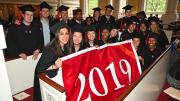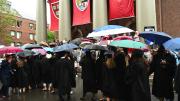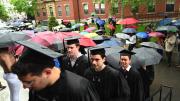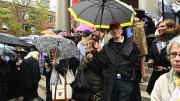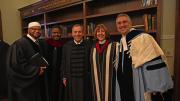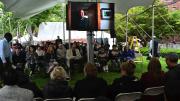Rain did not dampen the spirits of Harvard’s class of 2019 on the day of their baccalaureate. When Plummer professor of Christian morals and Pusey minister in the Memorial Church Jonathan L. Walton offered the assembly congratulations, the church erupted in cheers.
But once their exuberance had been aired, Walton, in his last year conducting the service at Harvard (he becomes dean of Wake Forest’s School of Divinity on July 1), told the students a story, pointing to the wall memorializing Harvard’s casualties in World War II. He singled out one name: Adolf Sannwald, who studied at Harvard Divinity School in 1924 and 1925. “He was a member of the German army during World War II. This is why ‘enemy casualty’ is etched next to his name,” Walton explained. But “Further research in recent years” revealed that “the Lutheran pastor was far from a Nazi. In 1934, he published an article that denounced Nazism’s view of racial supremacy. Sannwald was affiliated with the Confessing Church movement that protested Hitler's Third Reich. When the German army drafted Sannwald in 1942, military brass would not allow him to serve as a chaplain due to his sermons that were critical of the Nazi regime. German army leaders placed Sannwald on the front lines and within months he was killed in an air raid.
“I shared this story with you, class of 2019,” Walton continued, “for two reasons. First, the Memorial Church stands as a testament to service and sacrifice, duty and piety, Veritas and Caritas. We are all called to a cause greater than ourselves. The second reason I share this story with you is because like Adolf Sannwald, the presumed enemy combatant, we should never assume that our service in this world will come with accolades and awards. Trying to do the right thing may come with a price.”
The Baccalaureate ceremony, a Harvard tradition since the seventeenth century, now includes readings by members of the senior class from the religious texts of Islam, Judaism, Christianity, and Hinduism, as well as the traditional singing of Psalm 78 to the tune “St. Martin’s,” an observance since at least 1806. But its main purpose has been to allow the Harvard president to address the senior class.
President Lawrence S. Bacow, speaking in this capacity for the first time, delivered advice gleaned from personal experience, peppered with poetry and philosophy. He emphasized the importance and enduring nature of friendships forged during college. And he dispelled the popular idea that the choices each graduate will make after leaving Harvard would limit the range of their future experience: “Exercising your options can be unsettling because for the first time in your life, you may feel as if your world is narrowing. I’m here to tell you it’s not.”
Bacow then told a story about how he learned what he did not want to do, and the importance of “living your own life, not the life that others have planned for you.” After finishing his second year at Harvard Law School, he started a summer job at a law firm. He’d always thought he would become a lawyer, just like his father. “I thought it was what I wanted to do, and I knew it was what my father and other people expected me to do.
“One afternoon that summer,” he continued, “I was accounting for my billable hours, filling out a time sheet that broke every hour of my workday into six-minute increments. It is what lawyers do,” he explained. “From 9:00 to 9:06, finalize the deposition of Mrs. Jones; 9:06 to 9:12, call Dr. Smith to review his expert report; 9:12 to 9:18, continue to review expert report with Dr. Smith….You get the idea. Now before I continue, I want to say that the law can be deeply interesting and that the form its practice takes can be deeply satisfying for some people and, I suspect, will be deeply satisfying for some of you. I, however, had a different reaction to this experience. In fact, as my pencil hovered over 9:24 to 9:30—that particular window in time—my mind offered up a line from the T.S. Eliot poem, ‘The Love Song of J. Alfred Prufrock’: ‘I have measured out my life with coffee spoons.’ That line repeated itself to me over and over and over. Six minutes, six minutes, six minutes, and I realized that I was doing…what other people thought I should do and not, perhaps, what I thought I should do. When the summer ended, I began to let that idea of myself go and started figuring out how I really wanted to spend the rest of my life.
“Was it easy?” Bacow continued. “Absolutely not. My father was not happy that I abandoned the law. In fact, true story, I had to become president of Tufts before my father finally admitted I had made the right decision.
“I ended up diving into public policy, getting my Ph.D. and becoming a faculty member at MIT. If I had ignored that moment and pushed T.S. Eliot to the back of my mind, I would not be standing before you right now.”
Summing up, Bacow urged the seniors to “be open to serendipity…to recognize opportunity when it walks up and hits you in the face, because it will. In my wildest dreams, I never imagined I would someday be standing here before you as president of Harvard, and I guarantee you that nobody around me—my classmates, my wife, my father—would ever imagine me here.”
“Always remember that you don't have to stop breathing to stop living. ‘Life,’ Jean-Jacques Rousseau observed, ‘consists less in length of days than in the keen sense of living. A man may be buried at a hundred and may never have lived at all. He would have fared better had he died young.’
“Members of the class of 2019, may each of you embrace your freedom. May you live fully, and find ways to mend and improve our world. And may your happiness and satisfaction be so abundant as to defy measurement. By my count, you've got about 27 hours—or as T.S. Eliot would say, 270 coffee spoons—left on your undergraduate clock.” And with that, he wished them “the best of luck and Godspeed.”
Read the full text of Bacow’s address below:
Welcome, members of the Class of 2019, soon-to-be alumni of Harvard College. You have the distinct privilege of being my first graduating class, and I can say unambiguously that at least, as far as I’m concerned, you are also the best Harvard College graduating class in history.
So I have a question for you—where has the time gone?
When I welcomed our first-year students in August, I told them that, accounting for ample time sleeping—which I know many of you have not gotten—they had approximately 21,000 hours to explore this extraordinary institution, 21,000 hours to find a passion and where it leads, 21,000 hours to discover what matters to them and to determine how they can make the world a better place.
So, how did your class—how did you—spend those precious hours? There were, of course, the sections and labs, the p-sets and papers, the capstones and theses. There were the applications and the interviews—the commiserations and—I hope—the celebrations.
You dominated opponents on the court and on the field, the mat and the track; in and on water, ice, and snow. You wowed audiences with breakout performances and arresting works of art. You wrote poetry and prose—and compiled countless lines of code. You mastered languages, traveled far and wide, and represented Harvard around the world.
You served the public in towns and cities across the nation, volunteered all over Cambridge and Boston, and mentored kids in Allston. You made it possible for members of our community to gain their American citizenship, and you vowed to support and defend the Constitution of the United States against all enemies, foreign and domestic.
You made every single corner of this campus your own—from the steps of this church to the stacks of Widener to the galleries of the Harvard Art Museums. Some of you went all the way to the Quad—and some even farther—trekking to Allston to pitch your ideas at the i-lab and throwing pottery at the Ceramics Studio. You made swing spaces home for the sake of House renewal—and you stormed Harvard Yard to share good news with your newest neighbors.
Then there was that time you avoided the mumps. And bemoaned the end of Harvard time. And mourned the loss of Greenhouse Café. Somewhere in the middle there was a presidential election. And then there was the first time you frittered away an hour with friends in the new Smith Campus Center—and the last hour you spent studying for finals and wishing for the end.
Well guess what? Here it is. The end is a lot like the beginning—classmates elbow to elbow—everyone peering into the inscrutable beyond. But now the faces around you are all familiar, and the question is not “Will I make friends?” but rather “How can I leave them?”
Mark my words: Nothing you have achieved over the last 21,000 hours or so will be as valuable to you in the future as the relationships you have created here. I say that as someone whose best friends are still the people I met in college. They have been with me through every phase of my life; they have cheered me on and lifted me up. My college friends are still a huge part of my life. They have been there during good times and been there during hard times. They—and many of Adele’s lifelong friends—were seated in the first rows at my inauguration in October.
If you’re like the classes that have come before you, you will continue to play a very large role in each others’ lives. You will share all of life’s passages together: falling in love, the birth of children, career successes, and career setbacks. And yes, there will be setbacks. Over time you will only grow closer. So don’t mourn what you are leaving behind this week—if these years at Harvard prove to be the time of your life, then you are selling yourself short. It only gets better from here. In all fairness, you will have to cook your own food from now on, and maybe even get into work by nine o’clock or, God forbid, even earlier. But you can spend your time nurturing the relationships you started here. You can create a community for yourself that enables the same spontaneity you’ve cherished over the past four years. You can choose to embrace your newfound freedom.
As strange as it may sound to you now, freedom is embraced fully through choice. In many ways, your life up to this point has been about accumulating options. When you were in high school, the attainment of goals and grades created a longer and longer list of colleges and universities where you might be admitted. When you were living in Harvard Yard, a willingness to try everything and to get to know everyone expanded your set of opportunities—to create, to comp, to concentrate, to perform, to play. When you were living in the Houses, a deep commitment to doing your best—and to taking full advantage of this extraordinary place—revealed more and more avenues for you to explore after graduating—fellowships and jobs—master’s degrees and doctoral degrees and professional degrees—towns and cities, neighborhoods and apartments literally all over the world.
After years of amassing options, you are now faced with the prospect of having to exercise them—the act of walking down one avenue and necessarily forsaking others. Making these choices—exercising your options—can be unsettling, because for the first time in your life, you may feel as if your world is narrowing. I’m here to tell you, it’s not. Be prepared because you may end up somewhere completely unexpected. After I finished my second year of law school at Harvard, I started a summer job at—you guessed it— a law firm. Now, I had spent my entire life up to that point imagining that I would become a lawyer, just like my father. I thought it was what I wanted to do, and I knew it was what my father and other people expected me to do. One afternoon that summer, I was accounting for my billable hours, filling out a timesheet that broke every hour of my workday into six-minute increments—it is what lawyers do.
9:00 to 9:06 – Finalize deposition of Mrs. Jones
9:06 to 9:12 – Call Dr. Smith to review his expert report
9:12 to 9:18 – Continue to review expert report with Dr. Smith
9:18 to 9:24 – Summarize telephone conversation with Dr. Smith
You get the picture. Now, before I continue, I want to say that the law is deeply interesting and that the form its practice takes is deeply satisfying for some people—and, I suspect, will be deeply satisfying for some of you. I, however, had a different reaction to this experience. As my pencil hovered over 9:24 to 9:30, that particular window in time, my mind offered up a line from the T.S. Eliot poem The Love Song of J. Alfred Prufrock:
I have measured out my life with coffee spoons;
That line repeated itself to me over and over and over—six minutes, six minutes, six minutes—and I realized that I was doing something because of what other people thought I should do and not, perhaps, what I thought I should do. When the summer ended, I began to let that idea of myself go, and I started figuring out how I really wanted to spend the rest of my life.
Was it easy? Absolutely not. My father was not happy that I abandoned the law. In fact, I had to become president of Tufts before my father finally admitted that I made the right decision. And my law school classmates ended up telling me years later that they were actually worried about me that semester because I wasn’t interviewing with other law firms. I didn’t know what I was going to do. I seemed to be adrift. Some even thought me, at the time, aimless. But I can tell you that aimlessness can be paralyzing and it can also be liberating—a state of anxiety or a state of possibility. I ended up diving into public policy, getting my Ph.D., and becoming a faculty member at MIT. If I had ignored that moment and pushed T.S. Eliot to the back of my mind, I wouldn’t be standing here before you right now.
It’s important that you live your own life, not the life that others have planned for you. Sometimes figuring out what you don’t want to do is as valuable as figuring out what you do want to do. Be wary of five-year plans or ten-year plans or long-term plans. In my experience, those who lead their life according to some masterplan are often disappointed when they ultimately reach their destination. They have been so focused on their goal that when they get there they often ask themselves, “Is this all there is?” Be open to serendipity. Perhaps the most valuable advice I can give you is to recognize opportunity when it walks up and hits you in the face, because it will. In my wildest dreams I never imagined I would someday be standing here before you as President of Harvard, and I guarantee you that nobody around me—my classmates, my wife, my father—would ever imagine me here.
Always remember that you don’t have to stop breathing to stop living. “Life,” Jean Jacques Rousseau observed, “consists less in length of days than in the keen sense of living. A man may be buried at a hundred and may never have lived at all. He would have fared better had he died young.”
Members of the Class of 2019: May each of you embrace your freedom. May you live fully and find ways to mend and improve our world. And may your happiness and satisfaction be so abundant as to defy measurement. By my count, you’ve got about 27 hours—or, as T.S. Eliot would say, 270 coffee spoons—left on your undergraduate clock. As the old song goes, enjoy yourself—it’s later than you think.
Given the nature of this ceremony, it seems appropriate to close with words of a Talmudic scholar, “I have learned much from my teachers, more from my colleagues, but most from my students.” To the class of 2019, on behalf of the entire Harvard faculty, I would like to thank you for having taught all of us so well. We will follow your path forward from here with great interest. I hope you will always stay in touch.
On behalf of both Adele and me, thank you for letting us share in this, your final year at Harvard. We wish you the best of luck and Godspeed.
